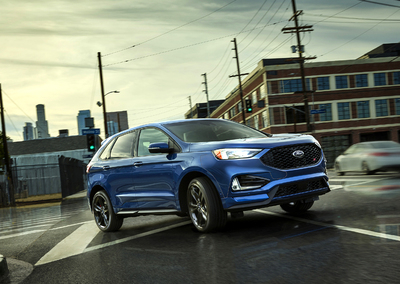2019 Ford Edge Uses Artificial Intelligence To Improve Traction and Reduce Fuel Usage
• New 2019 Ford Edge, including all-new performance-enhanced Edge ST, introduces new all-wheel-drive disconnect, a first-for-Ford system that helps improve traction and reduce gas usage over the previous model
• All-wheel-drive disconnect switches automatically between two-wheel and all-wheel drive in a fraction of a second, using a form of artificial intelligence to sift through information like wheel slip, road conditions, vehicle speed, windshield wiper usage and outside temperature
• Other Edge and Edge ST tech features that help reduce fuel consumption include active transmission warm-up, deceleration fuel shutoff and exhaust gas recirculation
 2019 Ford Edge ST |
The system is called all-wheel-drive disconnect, a first-for-Ford technology that uses a form of artificial intelligence that can calculate quicker than the human brain. Based on information received from dozens of high-tech sensors, the new Edge can determine in a fraction of a second whether all-wheel drive is needed.
“The concept is pretty simple, it was the execution that was the challenge,” said Scott Beiring, Ford driveline applications supervisor. “Shifting between two- and all-wheel drive needs to be fast and seamless enough that the customer doesn’t know it is happening.”
The system uses an all-new dedicated electronic brain that receives inputs from dozens of sensors throughout the vehicle. It interacts with the traction control system to detect wheel slip, receiving inputs from the anti-lock brakes to learn if that system is active. It even detects if the windshield wipers are on, whether the Edge is towing a trailer, and the outside temperature.
Power control – on the fly
 2019 Ford Edge ST |
“‘Fuzzy logic’ refers to the algorithm,” Beiring said. “It’s like you or I determining what to wear based on reading a weather forecast, where we’re going, the time of year and looking outside. In the case of the new Edge, just because the windshield wipers are on doesn’t mean all-wheel drive is going to engage. The algorithm makes the call based on a variety of things that are happening – but much faster than a person could process.
“There are similar systems out there, but none quite like this,” he added. “The fact that we’re able to switch seamlessly and without any input from the driver, that’s the real magic.”
More tech to burn less fuel
All-wheel-drive disconnect is only one reason for the 2019 Ford Edge’s improved EPA-estimated fuel economy ratings. All-wheel drive equipped vehicles have EPA-estimated fuel economy ratings of 21 mpg city/28 mpg highway/23 mpg combined. Front-wheel drive vehicles have EPA-estimated fuel economy ratings of 22 mpg city/29 mpg highway/25 mpg combined.
With standard all-wheel drive and a 2.7-liter V6 EcoBoost® engine, Edge ST, the first SUV from the Ford Performance team, has EPA-estimated fuel economy ratings of 19 mpg city/26 mpg highway/21 mpg combined. Actual mileage may vary.
Those EPA-estimated ratings represent improvements over current Edge models[1] – improvements that the addition of several new technologies as well as a handful of aerodynamic enhancements helped achieve.
Fuel-saving tech features on the new Edge include the following:
- New 8-speed automatic transmission introduces two overdrive gears, which decrease engine rpm for improved fuel economy during highway cruising
- Active transmission warm-up uses reclaimed heat energy to warm up the transmission faster. This, along with a durable, synthetic, ultra-low-viscosity fluid – engineered specifically for the new Edge – reduces component friction and helps save fuel
- Standard Auto Start-Stop helps save fuel by shutting off the engine when the vehicle comes to a stop and automatically restarts when the driver releases the brake pedal
- Deceleration fuel shut-off stops fuel flow to the engine when the vehicle is reducing speed
- Exhaust gas recirculation not only reduces harmful emissions, but increases efficiency by allowing a larger throttle position, thereby reducing pumping losses
To improve Edge aerodynamics, 2019 models are equipped with active grille shutters, full underbody shields and air curtains that create a high-pressure region of air around the outer surface of the wheels and tires for reduced drag.
The new Edge and Edge ST are due to arrive in showrooms later this month.
[1] Ratings for 2019 Edge ST compared to ratings for 2018 Edge Sport.



